Ever returned from a trip abroad to Nigeria and was hit by a nauseating feeling once you hit the roads?
I bet you have.
The vile smell from clogged drains and canals teeming with floating cans, nylon water sachets, empty bottles and other waste materials discarded by humans; incessant waste littering dumps of metal scraps; fogs of smoke from industrial and energy plants, bush burning and refuse burning; and every other unpleasant sight you can think of.
According to a Unido report, Nigeria alone generates more than 32 million tons of solid waste annually, out of which 20-30% is collected. The purported Giant of Africa is ranked among the top 20 countries contributing 83% of the total volume of land-based plastic waste in the oceans”.
But this is not only a Nigerian problem; it is a global challenge. But the third world continent is most hit. As a matter of fact, Africa is home to 19 of the world’s 50 largest dumpsites, the majority of which are in Sub-Saharan Africa. More than 90% of Africa’s trash is disposed of in unregulated dumpsites and landfills, frequently followed by open burning.
It is clear that Africa’s current waste management practices are causing major economic, social, and environmental impacts. The spike in plastic usage and a lack of trash collection infrastructure is causing an increase in marine plastic pollution, which is harming coastal economies. Poor trash dumping, disposal, and burning are causing greenhouse gas emissions to rise, damaging ground and surface water. It also raises the risk of sickness and causes air pollution, both of which negatively impact human health.
However, the growing risks of inadequate waste management present African governments, companies, innovators, startups and individual entrepreneurs in sub-Saharan Africa with a huge opportunity to launch new and inclusive ideas to respond to waste management issues by seeking gaps in the innovation landscape.
The good thing is that many governments and startups are already taking the initiative in creatively and innovatively managing their waste to provide sustainable and eco-friendly solutions.
TakaTaka, a Kenyan enterprise, has actively managed waste collection, sorting, composting, plastic recycling, and acquiring waste from waste materials pickers. The project has reduced Kenya’s carbon footprints and gas emission effluents, resulting in a cleaner and healthier environment while providing jobs for women and youths in low-income communities.
The Ethiopian government has converted the Koshe dumpsite into a waste-to-energy facility that incinerates around 1,400 tonnes of waste materials daily to generate power. As a result, roughly 80% of Addis Abeba’s garbage has been repurposed for energy generation, with the city providing approximately 30% of residential electricity.
Rubbish disposal and management companies in South Africa have invested in innovative technologies to manage waste collection efficiently. These businesses use user-friendly smartphone applications to facilitate timely service, extra pickups, and bill payments through push notifications. This innovative technology has effectively increased cost-effective garbage collection expenses by simplifying waste material collecting processes.
Though the Nigerian government have refused to be proactive in the fight against environmental pollution, there are many success stories where companies and wastepreneurs have generated creative and innovative waste management solutions. Some companies produce apparel and bags from plastic shopping bags and pure water sachets, repurposing plastics into kitchenware and interior design, recycling tyres into furniture, making fashion accessories out of leather wastes, and creating art pieces from junk metals and tins.
Let us consider some Nigerian wastepreneurs revolutionising the waste industry
Ade Dagunduro
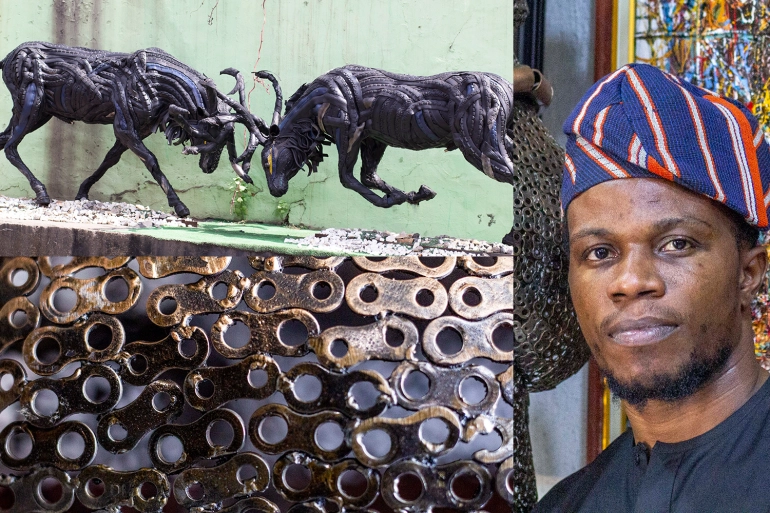 35-year-old Ade Dagunduro, a graduate of Fine Art from Obafemi Awolowo University, Ile-Ife, uses waste materials such as car tyres, scrap metal, rope and plastic to form works of art at his studio in Dugbe, Idaban.
35-year-old Ade Dagunduro, a graduate of Fine Art from Obafemi Awolowo University, Ile-Ife, uses waste materials such as car tyres, scrap metal, rope and plastic to form works of art at his studio in Dugbe, Idaban.
Originally working with traditional art materials such as paint, clay
and wood, five years ago, Dagunduro decided to think outside the box and think of a creative way to do his art. His first work with waste in 2016 was an ox made out of a tyre called The Challenge.
Dagunduro’s latest work, titled Torso, is a female form made from dismantled motorcycle chains – which he picked up from a motorcycle mechanic’s workshop.
Adejoke Lasisi
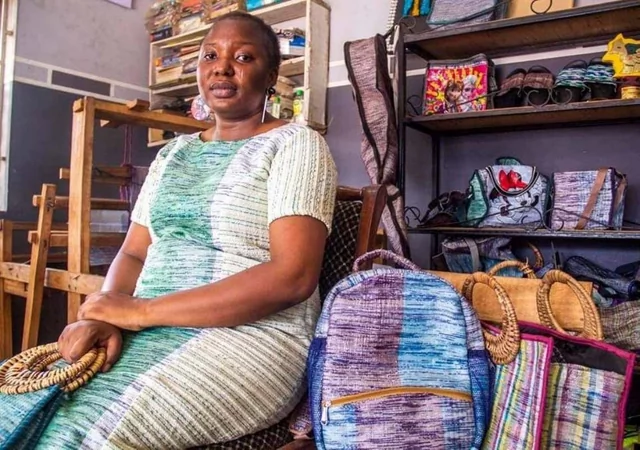 Adejoke Lasisi, who is in her early thirties, comes from a traditional Ibadan weaving family. She’s now using her talent to help her hometown alleviate some of its garbage problems. Lasisi transforms discarded sachets of drinking water into art by weaving clothing, slippers, bags, purses, and mats out of them.
Adejoke Lasisi, who is in her early thirties, comes from a traditional Ibadan weaving family. She’s now using her talent to help her hometown alleviate some of its garbage problems. Lasisi transforms discarded sachets of drinking water into art by weaving clothing, slippers, bags, purses, and mats out of them.
Lasisi has teamed with many organisations and won multiple grants in Nigeria and abroad to train young people in the art since launching Planet3R, her for-profit company, in 2020.
One of her most popular products is a school bag made from 10% ofi and 90% nylon, which recycles 250 water sachets.
Wasiu Arowolo
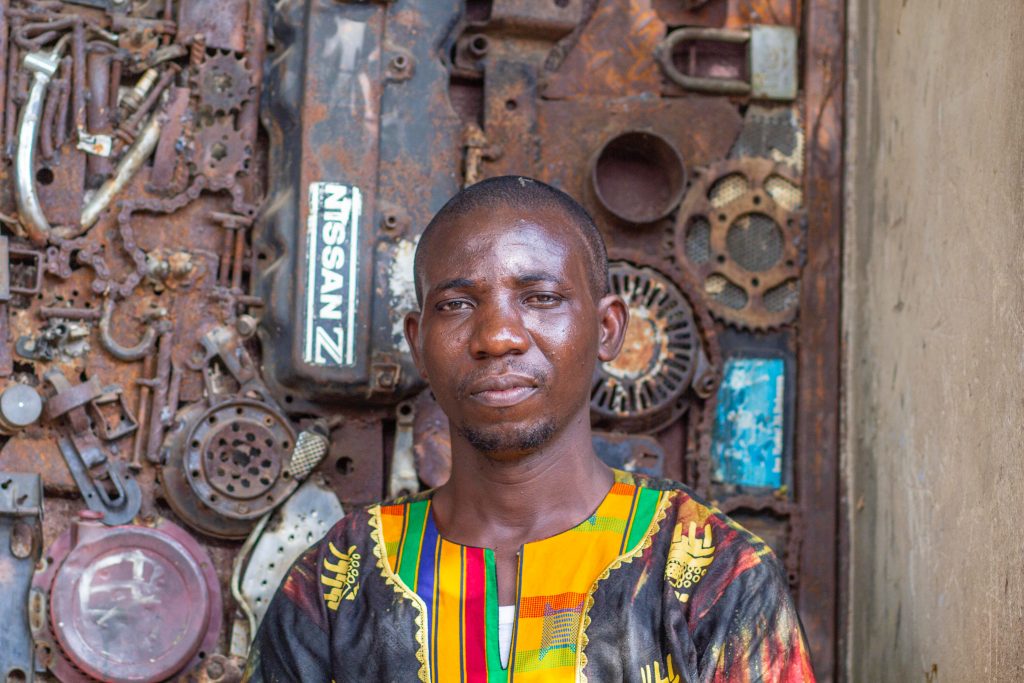 Wasiu Arowolo, the son of a mechanic, had always been fascinated with painting, but art was not considered a serious vocation in his Ibadan neighbourhood. Still, he followed it regardless, getting an apprenticeship at Topfat, a prominent gallery and studio, while his companions went to college.
Wasiu Arowolo, the son of a mechanic, had always been fascinated with painting, but art was not considered a serious vocation in his Ibadan neighbourhood. Still, he followed it regardless, getting an apprenticeship at Topfat, a prominent gallery and studio, while his companions went to college.
Unable to afford art tools and materials, Arowolo looked to nature for inspiration. His first piece was a butterfly made from tin cans, which he sold for 25,000 naira. He is now well-known for his artwork constructed from discarded materials, and his works are in high demand.
Jumoke Olowokere
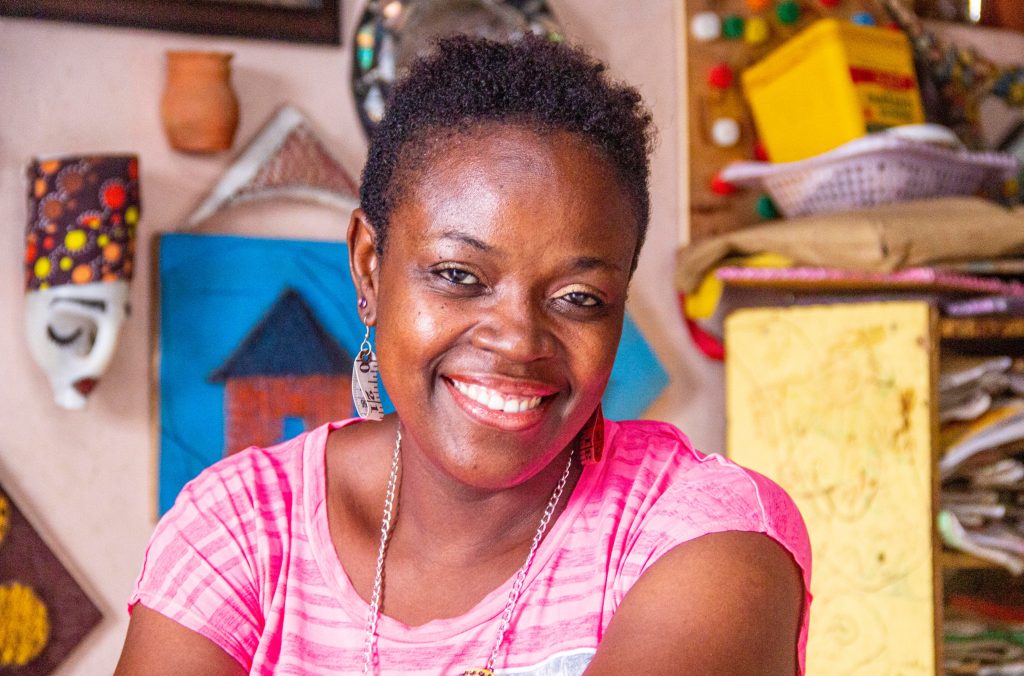 Jumoke Olowokere, 42, creates outdoor play equipment for children and ottoman seats, handwashing sinks, garden ornaments to sell at her shop in Ibadan, Nigeria, and even a big Christmas tree of used tyres and bottles.
Jumoke Olowokere, 42, creates outdoor play equipment for children and ottoman seats, handwashing sinks, garden ornaments to sell at her shop in Ibadan, Nigeria, and even a big Christmas tree of used tyres and bottles.
She celebrated her 40th birthday in 2019 by donating outdoor play equipment to 40 schools in the city, which was created with the kids’ help. They made swings and climbing frames out of old tyres and ropes, decorated with bottle tops. She is the founder of Africa Creativity and Sustainability Hub, where she trains people on how to convert their waste into artworks.
Ibrahim Gbadamosi
Ibra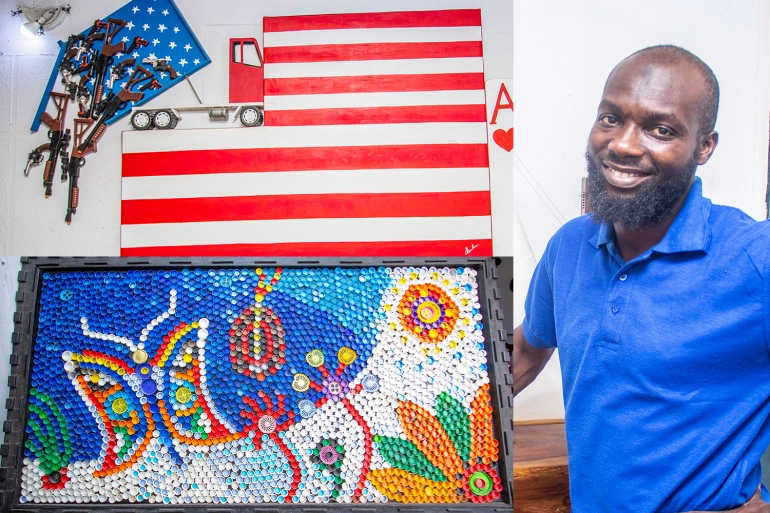 him Gbadamosi, 42, creates furniture and artwork out of garbage. Gbadamosi, a Geology graduate, resigned from a well-paying career to pursue his dream. He went all-in on art after his first solo exhibition in Lagos’ African Foundation for the Arts in November 2011. He got completely into recycling, utilising carpenter’s debris, bottle caps, and plastic due to his family’s lack of funds and support.
him Gbadamosi, 42, creates furniture and artwork out of garbage. Gbadamosi, a Geology graduate, resigned from a well-paying career to pursue his dream. He went all-in on art after his first solo exhibition in Lagos’ African Foundation for the Arts in November 2011. He got completely into recycling, utilising carpenter’s debris, bottle caps, and plastic due to his family’s lack of funds and support.
In his exhibition, these days, the personal and political are intertwined as he utilises his art to make bold statements about the current state of the globe. He brings up gun violence in the United States, for example, in his Politics of Violence series, while About Time portrays a truck attached to the US flag dumping weapons.
Olabanke Banjo
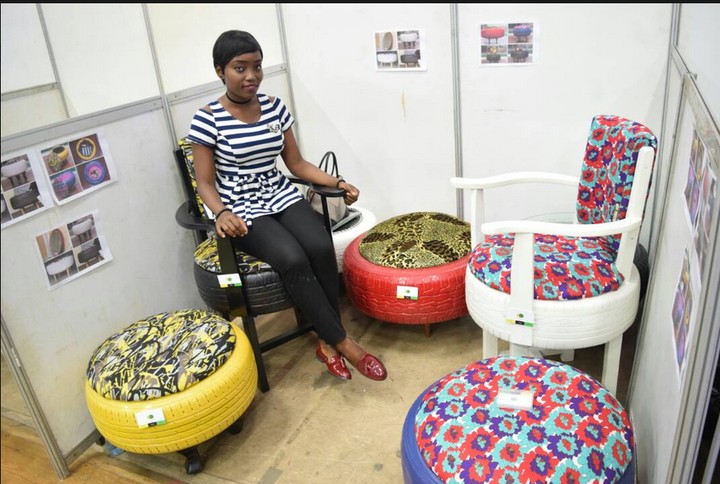 Olabanke Banjo, a former writer and digital strategist, quit her job to pursue a new entrepreneurial venture that combined her sense of creativity with an affinity for the environment.
Olabanke Banjo, a former writer and digital strategist, quit her job to pursue a new entrepreneurial venture that combined her sense of creativity with an affinity for the environment.
She upcycles tires sourced from refuse centres, incinerators, and individuals looking to replace the ones on their vehicle, as well as those found on the side of the road, to create “artsy and ultra-modern” pieces of furniture, including chairs, rockers, and ottomans that happen to be sustainable and earth-friendly.
Today, she is the founder and CEO of Cyrus45 Factory, a décor company that recycles and transforms used tires into interior design. She is just one among the many youths involved in the same venture like Favour Oluma, Ifedolapo Runsewe, Jumoke Olowookere and a host of others.
Many startups like TRASHit, GIVO, the popular WeCyclers and a host of others are driving social and environmental change through trash collection. They offer an automated system for collecting, processing and marketing recyclable materials in exchange for cash.
The list is endless.
People are taking action to rid their environment from the horrid sight of trash and make cool cash.
You, too, can create and innovate with waste.
Join DO and participate in our projects Innovate with Waste and Earn from Waste. These projects are aimed to educate and show people how to create innovative products from waste and earn from it, thereby creating jobs in the process.
You can as well collaborate with us through sponsorships, partnerships, and donations.
#InvestInOurPlanet